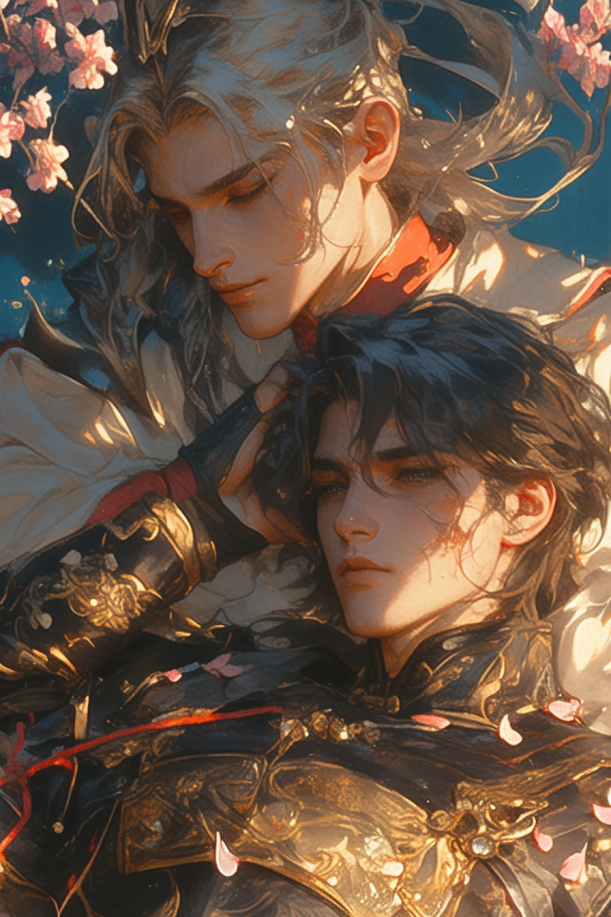Chapter 12
William Sullivan was inexplicably left behind by Charles, awkwardly touching his nose, unable to understand, and could only chalk it up to boys all having such a moody age. Master William, being a first-time father, felt a bit troubled, thinking to himself, “If I’d known, I would have kept that iron wristband for another day before giving it to him. Now he’s really upset—how do I coax him?”
He stood not too far nor too close by the edge of the dark river, hands behind his back. The giant kite had already thundered past him, its tail lights flickering on and off. The dark river behind him slowly closed up. William Sullivan only worried for a moment before he began to stare in the direction of those tail lights, but his gaze was not as unfocused as it usually was when he looked into the distance. Then, his brows slowly knitted together.
Suddenly, his figure flickered and he disappeared into the crowd like a swimming fish, his footsteps utterly silent, his movements swift beyond belief—nothing like his usual dawdling, where he’d stare at the threshold for ages before stepping over.
Charles trudged home with his head down. The hot wind blew over the cold river water on his body, cooling him off a bit, and the brooding anger in his brows and eyes gradually dissipated.
His eyes looked very much like Grace’s. The newly defined contours of his face were strikingly deep, not quite like someone from the Central Plains... but not really like a foreigner either. In short, it was a very unique kind of handsomeness.
As soon as Charles stepped through the door, he saw Old Cook tiptoeing and peeking outside. When Old Cook saw how bedraggled he looked, she was first startled: “Oh my, how did you end up like this?”
“It’s nothing,” Charles replied weakly. “Someone fell in the river, I just gave them a hand, got myself all wet.”
Old Cook then shuffled along behind him in small steps, chattering, “Madam said not to set the table yet. I think she’s waiting for the Master of the Hundred Households—oh, right, Madam said when Young Master comes home, he should go to her room. She said there’s some private mother-son talk.”
Charles paused in his steps, his shoulders tensing involuntarily. After a moment, he nodded expressionlessly, went back to his room to change into dry clothes, sulking as he carefully folded and put away William Sullivan’s outer robe. Only then did he pick up the rouge box and head to Grace’s room.
Old Cook was dying of curiosity about the strange relationship between Charles and his mother, but didn’t dare ask openly, so she just followed, craning her neck to peek.
At Grace’s door, Charles meticulously straightened his clothes, as if preparing to meet a guest, making himself neat and proper. Only then did he knock on Grace’s door, lowering his eyes: “Mother.”
A cold, distant woman’s voice came from inside: “Come in.”
Charles reached out and pushed open the door. After entering, he glanced back. The peeking Old Cook met his gaze, got a fright, quickly looked away, and when she peeked again, the door was already closed, revealing nothing.
Grace’s room was very dark, with the sun-facing window covered by a curtain.
She seemed to shun the light, sitting alone in a dim corner, facing a dressing mirror.
Charles saw her back and frowned slightly—Grace, for some reason, was wearing a pale yellow ruqun and had her hair done up like an unmarried girl. Time had treated her kindly, and with the dim lighting in the room, the fine wrinkles at the corners of her eyes were easily concealed. She really did look like a young maiden in her late teens.
Charles opened his mouth, about to call her, but Grace spoke first: “There’s no one else here, don’t call me mother—did you buy the rouge?”
Hearing this, Charles swallowed the second “mother” back down, letting it be digested into nothingness by his insides. He walked over and gently tossed the rouge box, warmed by his palm, onto Grace’s dressing table.
“Oh, this color is nice and bright.” Grace finally showed a stingy smile.
She pinched a bit of rouge with her fingertip, dabbed it on her pale lips, and looked at herself in the mirror with great interest, asking, “Does it look good?”
Charles stood to the side with a cold expression, silent, secretly curious as to why Grace had called him over for no apparent reason.
As he was thinking this, his eyelid suddenly twitched twice without warning. Charles’s heart skipped a beat, as if some ominous premonition arose within him.
At that moment, Grace spoke: “From now on, you don’t have to call me mother in front of others either. The bond between us as mother and son—today, it ends.”
As she spoke, she lifted her radiant, elaborately made-up face, reaching out with slender, delicate hands as if to straighten Charles’s collar.
Charles suddenly dodged back: “What do you mean?”
☆, Chapter 6: The Curse
Grace smiled, unconcerned, and withdrew her hand.
Her lips were painted with the rouge bought by William Sullivan, and her pale, dignified face suddenly had a touch of vivid color, like a flower soaked in fresh blood.
“I know you’ve always wondered in your heart. Today, since we have the chance, let’s make things clear—you really aren’t my biological son,” Grace said. “Does saying it like this make you feel any better?”
The corner of Charles’s eye twitched slightly. After all, he was still young and hadn’t yet learned to hide his emotions.
